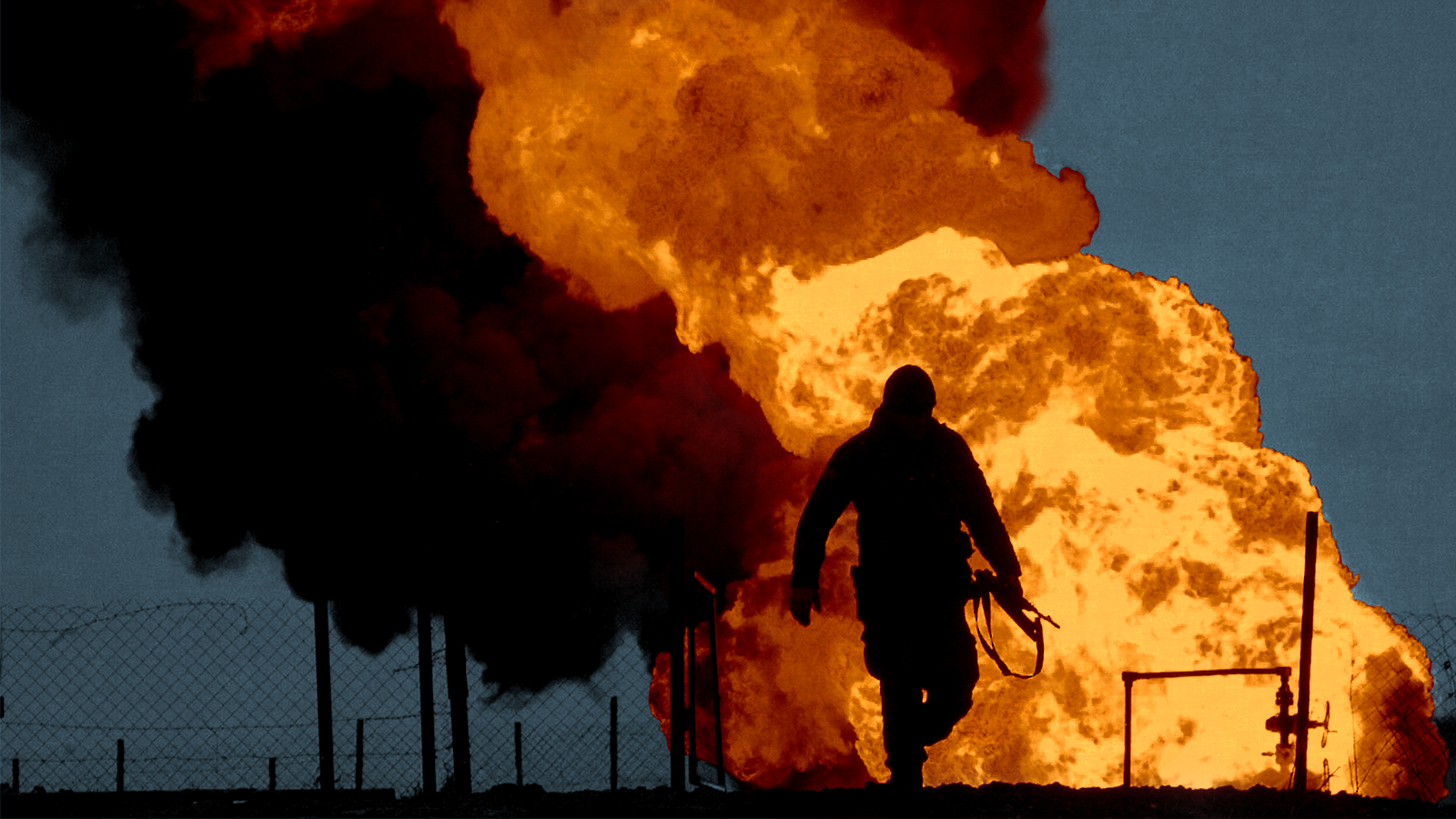Putin's brutal record in Chechnya and Syria is ominous for Ukraine
Do those fights preview the present war?


A free daily email with the biggest news stories of the day – and the best features from TheWeek.com
You are now subscribed
Your newsletter sign-up was successful
Wars aren't civilized. The very definition of war includes death and cruelty, and everyone who dies has loved ones who mourn them.
But some wars are more brutal than others, more deadly to civilians, and Russia's recent wars in Chechnya and Syria stand out. Can those fights offer a preview of what the world can expect in Ukraine?
The Russian Federation fought its first war against Chechnya in 1994. It went on until 1996, was hugely unpopular at home, and showed that what had been a Soviet bear of a military was now a toothless Russian tiger. Russia's President Boris Yeltsin had to settle for a ceasefire over a definitive victory.
The Week
Escape your echo chamber. Get the facts behind the news, plus analysis from multiple perspectives.

Sign up for The Week's Free Newsletters
From our morning news briefing to a weekly Good News Newsletter, get the best of The Week delivered directly to your inbox.
From our morning news briefing to a weekly Good News Newsletter, get the best of The Week delivered directly to your inbox.
The second Chechen war began in 1999. It was then-Prime Minister Vladimir Putin's war, and it was to the death. A "they make a desert and call it peace" kind of war. The Chechen capital of Grozny — already damaged by the first war — was left as a hole in a map, called the most destroyed city on the planet by the United Nations. Almost nothing was left standing, nearly no one spared.
As many as 250,000 civilians were killed in the combined Chechen wars, along with many thousands more combatants on both sides. Reports of rape, arson, torture, and other crimes by Russian soldiers were widespread — and cast as a wholly necessary evil by those forces. "Without bespredel [no limits warfare], we'll get nowhere in Chechnya," a 21-year-old Russian conscript told the Los Angeles Times in 2000. "We have to be cruel to them. Otherwise, we'll achieve nothing."
The Russians employed infantry, special forces, tanks, and artillery, as well as carpet-bombing parts of Chechnya, with seemingly little regard for whether civilians were underneath their planes.
There's also evidence of cluster bombs being employed. These are larger bombs that contain smaller explosive munitions inside; when the larger shell detonates, the smaller bombs spread with no control over where they will land. They're banned by international treaty largely because they typically cause more civilian casualties than other bombs, though neither Russia nor the United States have signed that pact.
A free daily email with the biggest news stories of the day – and the best features from TheWeek.com
Russia again used cluster bombs in Syria, a war it joined in 2015, a war Putin, now president, fought largely through the air, with Syrian President Bashar al-Assad's troops providing ground forces.
The bombing was not indiscriminate. It was worse: Hospitals were considered legitimate targets by Russian commanders. Even civilians whose only concern was the safety of others — rescue workers called the White Helmets because of the hardhats they wore — were killed while they were responding to earlier attacks.

Russia denies civilian deaths from any of the air strikes.
The city of Aleppo, Syria, was particularly hard hit in a siege that went on for four years. It was ended in 2016 in large part by Russian air power. And what had been an ancient center of culture and the largest city in modern Syria was a sea of broken concrete and bent rebar.
Thousands of civilians died. That was inevitable given the tactics chosen: "Using that amount of firepower in an urban area with tens, if not hundreds, of thousands of civilians, predictably killed hundreds of civilians," Human Rights Watch reported in 2016. "Those who ordered and carried out unlawful attacks should be tried for war crimes."
So what about Ukraine? Rocket attacks have hit Kharkiv, Ukraine's second-largest city, killing dozens of people. Bombs are falling on Kyiv, the capital. But, so far, Russia hasn't churned these cities into rubble, though it has the power to do so a thousand times over.
But that says nothing about the future as Putin becomes more frustrated and angry. The war isn't going the way he expected. And historically, Russian tactics have varied little, with cities being pounded before the ground assault begins, Russia expert Mark Galeotti told The Week.
"They bomb them into rubble and put a flag on top," he said. "In Ukraine, they have mass firepower in the van, and we fear that this is going to get very ugly."
Jason Fields is a writer, editor, podcaster, and photographer who has worked at Reuters, The New York Times, The Associated Press, and The Washington Post. He hosts the Angry Planet podcast and is the author of the historical mystery "Death in Twilight."
-
 6 of the world’s most accessible destinations
6 of the world’s most accessible destinationsThe Week Recommends Experience all of Berlin, Singapore and Sydney
-
 How the FCC’s ‘equal time’ rule works
How the FCC’s ‘equal time’ rule worksIn the Spotlight The law is at the heart of the Colbert-CBS conflict
-
 What is the endgame in the DHS shutdown?
What is the endgame in the DHS shutdown?Today’s Big Question Democrats want to rein in ICE’s immigration crackdown
-
 What is ‘Arctic Sentry’ and will it deter Russia and China?
What is ‘Arctic Sentry’ and will it deter Russia and China?Today’s Big Question Nato considers joint operation and intelligence sharing in Arctic region, in face of Trump’s threats to seize Greenland for ‘protection’
-
 What would a UK deployment to Ukraine look like?
What would a UK deployment to Ukraine look like?Today's Big Question Security agreement commits British and French forces in event of ceasefire
-
 Would Europe defend Greenland from US aggression?
Would Europe defend Greenland from US aggression?Today’s Big Question ‘Mildness’ of EU pushback against Trump provocation ‘illustrates the bind Europe finds itself in’
-
 Did Trump just end the US-Europe alliance?
Did Trump just end the US-Europe alliance?Today's Big Question New US national security policy drops ‘grenade’ on Europe and should serve as ‘the mother of all wake-up calls’
-
 Is conscription the answer to Europe’s security woes?
Is conscription the answer to Europe’s security woes?Today's Big Question How best to boost troop numbers to deal with Russian threat is ‘prompting fierce and soul-searching debates’
-
 Trump peace deal: an offer Zelenskyy can’t refuse?
Trump peace deal: an offer Zelenskyy can’t refuse?Today’s Big Question ‘Unpalatable’ US plan may strengthen embattled Ukrainian president at home
-
 Vladimir Putin’s ‘nuclear tsunami’ missile
Vladimir Putin’s ‘nuclear tsunami’ missileThe Explainer Russian president has boasted that there is no way to intercept the new weapon
-
 The Baltic ‘bog belt’ plan to protect Europe from Russia
The Baltic ‘bog belt’ plan to protect Europe from RussiaUnder the Radar Reviving lost wetland on Nato’s eastern flank would fuse ‘two European priorities that increasingly compete for attention and funding: defence and climate’
